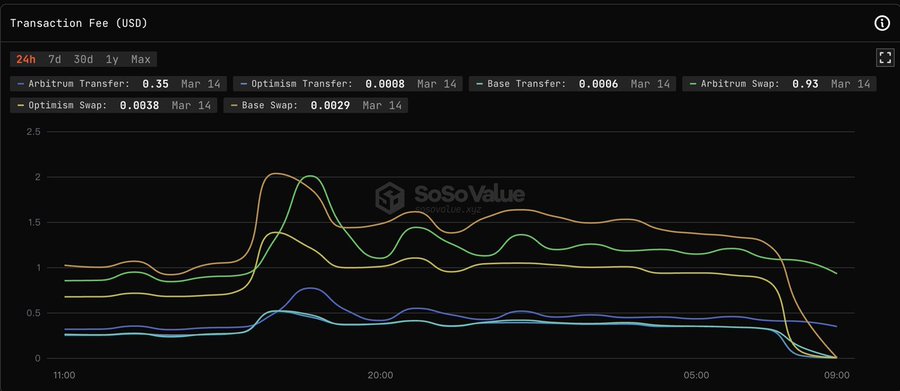Transaction fees across various Ethereum layer-2 networks, such as Base, StarkNet, and Optimism, have seen significant reductions following the implementation of the Dencun upgrade.
Yesterday, the Dencun upgrade went live after months of anticipation within the crypto community. The upgrade, described as the most “complex fork” since Ethereum transitioned into a proof-of-stake network, introduced a new transaction type called blobs for layer-2 networks.
Dencun introduced Ethereum ‘blobs’, which are temporary data storage mechanisms that significantly reduce transaction fees and enhance throughput for Layer 2 networks by allowing for a more efficient and cost-effective way to post rollup data. This data is pruned from the blockchain after roughly 18 days to maintain network efficiency.
Fee reduction
Jesse Pollack, a contributor to Base, reported a reduction in the network transaction fees from $0.31 to $0.0005.
Meanwhile, OKLink data places Base’s average fee at around $0.18 compared to the previous $0.88. The data also shows that layer-2 network Optimism fees were drastically reduced to a few cents from earlier levels of more than $1.
StarkNet also witnessed a 99% fee reduction. Argent, a prominent wallet provider for the network, reported an average fee of $0.04 for swaps, contrasting sharply with the over $6.8 observed before Dencun.
Blockchain analytical platform SoSo Value corroborated these downtrends, stating that there were “ dramatic drops in transfer (unidirectional) and swap (bidirectional) fees for Arbitrum, Optimism, and Base since March 14th, 7:00 am (HKT).”

Interestingly, Ethereum developers started storing the entire Bee Movie script, a comedic animation featuring Jerry Seinfeld, on the Ethereum blockchain at a minimal cost.
Enhanced adoption
With transaction fees on layer-2 networks declining, stakeholders anticipate further adoption of the Ethereum network.
Brian Armstrong, CEO of Coinbase, echoed this optimism, emphasizing the potential for expanded crypto use cases with reduced transaction fees and confirmation times on layer-2 blockchains.
Similarly, Eli Ben-Sasson, a board member at Starknet Foundation, told CryptoSlate that the Dencun upgrade would be viewed as “the moment that decentralized applications (dApps) that weren’t viable fee-wise became practical. Today will go down as the date of birth for a dApp-for-everything culture.”



